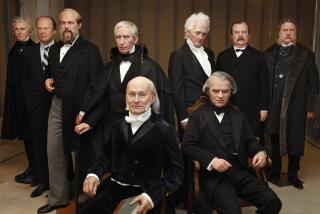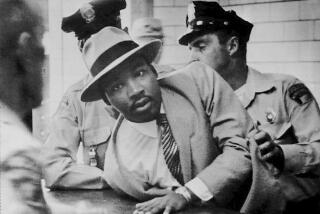Presidential Greatness Isn’t Cheap
- Share via
The latest word from White House aides is that Bill Clinton is becoming preoccupied with his place in history.
Such are the vast expanses of the presidential ego that three months into his second term, Clinton is obsessed with what he can accomplish that will allow him to rank with Lincoln, Washington and Roosevelt. Apparently, he is unhappy because, without a serious crisis to mark his presidency, he will be consigned to the middle of the pack when our presidents are ranked in terms of their accomplishments while in office. So without the gift of a war, an economic collapse or some other overwhelming disaster that would give him the chance to strut his stuff, Clinton has begun the struggle to identify an accomplishment that will allow him to claim greatness.
The problem with this line of thinking is that it represents the worst kind of misplaced priorities. Great leaders don’t follow a particular course of action in hopes that they will go down in history. Rather, they earn their greatness as a natural result of their actions. If this seems like a distinction without a difference, try to imagine Lincoln plotting to rip the nation in two in order to have a civil war that would give him the opportunity to impress the historians.
According to his advisors, Clinton has settled on the state of race relations in America as his best opportunity to achieve greatness. There’s no question that the distrust and hostility between the races in our society is a serious crisis in need of significant attention. But while the opportunity for real progress exists, Clinton seems preoccupied, typically, with symbolism and ceremony instead of substantive action.
A useful example of Clinton’s approach has been his role in the discussion over the future of racial preferences. As a result of the presence of Proposition 209 on last November’s ballot, the people of California devoted most of the year to debating the best ways of achieving racial equality. Clinton caved quickly to the minority rights activists and opposed Proposition 209, but until the last days before the election, his opposition to the initiative was one of the campaign’s best-kept secrets.
Clinton kept virtually silent on the issue until the final weekend of the campaign. He devoted no campaign commercials to it. He allowed no Democratic campaign dollars to be spent in opposition to the initiative. Given the size of his lead in the polls in California throughout the campaign, Clinton’s active and vocal opposition might well have helped defeat Proposition 209. But rather than risk some of his political capital, Clinton was willing to let policy reform that he opposed become law. This is not the route that great leaders have taken on their way into the history books.
When a federal appeals court ruled that Proposition 209 should be implemented, Clinton was again presented with the opportunity to lead a conversation on the subject of race relations. He could have promised to work toward providing new opportunities for minorities through mentoring, early intervention and other sustained outreach programs. He could have used his bully pulpit to pledge to fight the court’s decision as strenuously as possible. Clinton instead chose a third option: A day after the decision was announced, the Justice Department put out a press release saying that the administration disagreed.
Instead, it is in the realm of the symbolic where Clinton has chosen to engage. Most recently, he stood with Jackie Robinson’s widow before a Dodgers-Mets game to commemorate her late husband’s role as the first African American to play major league baseball. For good measure, Clinton praised Robinson’s courage and said that professional sports franchises should hire more minorities as coaches and managers.
The president’s next step in his crusade toward history will be to apologize to the African American men who were the victims of government-sponsored syphilis research in the infamous Tuskegee experiment, which began in 1932. Of the 399 individuals denied treatment for the effects of the experiments, eight are still living. For all practical purposes, Clinton might as well be apologizing to Westside L.A. for what Pharaoh did to the Israelites.
It’s easy to apologize for someone else’s sins. It’s much tougher to confront them in one’s self. And an honored place in history rarely comes from saluting the courage of another. Eventually, you have to show some of your own.
More to Read
Get the L.A. Times Politics newsletter
Deeply reported insights into legislation, politics and policy from Sacramento, Washington and beyond. In your inbox twice per week.
You may occasionally receive promotional content from the Los Angeles Times.









